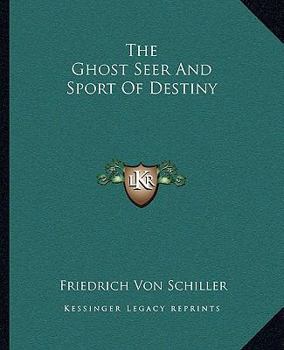The Ghost Seer And Sport Of Destiny
Select Format
Select Condition 
Book Overview
The Ghost Seer And Sport Of Destiny is a novel written by Friedrich Von Schiller. The book is a collection of two different works, The Ghost Seer and The Sport of Destiny. The Ghost Seer is a gothic tale of mystery and suspense, following the story of a young man named Count Moor who is haunted by a ghostly apparition. The apparition is said to be the ghost of a woman who was murdered by Moor's father, and she seeks revenge on the family. Moor sets...
Format:Paperback
Language:English
ISBN:1162695625
ISBN13:9781162695624
Release Date:September 2010
Publisher:Kessinger Publishing
Length:114 Pages
Weight:0.46 lbs.
Dimensions:0.2" x 7.5" x 9.3"
Customer Reviews
2 ratings
uncertainty is the most terrible damnation
Published by Thriftbooks.com User , 15 years ago
This love story is full of wonderful visual imagery, but it is overlaoded with gloom. I quote from page 39; 'Happy? Oh, I doubt whether I can ever be happy again! - But uncertainty is the most terrible damnation!' This novel is also a mystery story, probing behind the veil of death. It recalled to me another book I read recently 'Ghost Hunters' by Deborah Blum. On page 81 I found, 'I am like a messenger who is carrying a sealed letter to the place of its destination. What it contains might well be a matter of indifference to the messenger - he is simply out to earn payment for delivery.' Is that also our 'purpose' in living? To carry a message whose purpose and significance is unknowable to us?
The Ghost-Seer
Published by Thriftbooks.com User , 17 years ago
"The Ghost-Seer" is a novel written by Friedrich Schiller, the German playwright, poet and philosopher. The story was published in the 1780's, and Schiller eventually left it unfinished. While this is no doubt annoying, the work nevertheless has a certain interest. The main character is a German Prince who is manipulated by unknown forces during a visit to Venice. At first, the Prince is moral, pious and intellectually curious, but unfortunately his religious convictions are of a simplistic Pietist kind. He is also very superstitious and easily lead. A group of conspirators, led by a mysterious Armenian, takes advantage of this. First, they stage a Spiritualist seance during which the spirit of the Prince's best friend is conjured up. Next, they reveal that the seance was just a hoax. By this double bluff, the conspirators make the Prince loose his religious faith, and turn him into an out-and-out sceptic. As a sceptic, the Prince becomes immoral, lustful and completely uninterested in serious philosophy. He begins to advocate what's essentially an early version of Nietzscheanism: life is meaningless, and the only thing that matters is brute power. How or why power is won, is irrelevant. Eventually, the Prince realizes that his new "philosophy" only brings him personal unhappiness. How can anyone be happy, if life is meaningless? Unfortunately, the Prince doesn't want to end his immoral lifestyle. He wants "meaning" only for the sake of his own personal consolation. At this point, the conspirators strike again, and eventually converts the Prince to a false religion: Catholicism. The conversion is facilitated by stage-managing an unhappy love affair with a devout Catholic woman. In other words, the Prince embraces Catholicism for reasons of lust, rather than reasons of faith or intellectual conviction. During his stay in Venice, the Prince goes deeply into debt, to finance his new, libertine lifestyle. At the end of the story, he begins to contemplate a coup in his German principality, and perhaps an assasination of the legitimate heir to the throne, simply to get his hands on the family fortune. The story ends with the Prince attending a mass celebrated by the Armenian, who turns out to be a Catholic priest. What strikes modern readers as most odd with the story is that Schiller sees scepticism, libertinism and Catholicism as part of the same problem, even the same conspiracy. Perhaps this is how German Protestants and Deists saw Catholicism during the Enlightenment? The story becomes more comprehensible to modern readers if Catholicism is seen as a symbol of false religion. After all, somebody might argue that New Age and interest in the occult is simply the flip-side of Western libertine, libertarian materialism. New Age promises the believer quick fixes, and some versions of it are notoriously commercialized. And isn't worship of raw power typical both of certain "atheist" philosophers (Nietzsche) and some "New Religious Movements" (S






